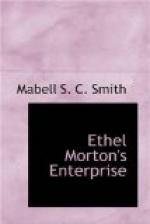“But, Grandfather, if the beauty is there right now why can’t we see it?” insisted Ethel Brown.
Mr. Emerson stared out of the window for a moment.
“That was a pretty necklace of beads you strung for Ayleesabet.”
“We all thought they were beauty beads.”
“And that was a lovely string of pearls that Mrs. Schermerhorn wore at the reception for which you girls decorated her house.”
There could be no disagreement from that opinion.
“Since Ayleesabet is provided with such beauties we shan’t have to fret about getting her anything else when she goes to her coming-out party, shall we?”
“What are you saying, Grandfather!” exclaimed Helen. “Of course Ayleesabet’s little string of beads can’t be compared with a pearl necklace!”
“There you are!” retorted Mr. Emerson; “Helen has explained it. This fairyland we are going to see can’t be compared with the glory of the sun any more than Ayleesabet’s beads can be compared with Mrs. Schermerhorn’s pearls. We don’t even see the fairyland when the sun is shining but when the sun has set the other beauties become clear.”
“O-o-o!” shouted Dicky, whose nose had been glued to the window in an effort to prove his grandfather’s statement; “look at that funny umbrella!”
Everybody jumped to one window or another, and they saw in the gathering darkness a sudden blast of flame and white hot particles shooting into the air and spreading out like an umbrella of vast size.
“Look at it!” exclaimed the two Ethels, in a breath; “isn’t that beautiful! What makes it?”
“The grimy steel mills of the daytime make the fairyland of night,” announced Mr. Emerson.
Across the river they noticed suddenly that the smoke pouring from a chimney had turned blood red with tongues of vivid flame shooting through it like pulsing veins. There was no longer any black smoke. It had changed to heavy masses of living fire of shifting shades. Great ingots of steel sent the observers a white hot greeting or glowed more coolly as the train shot by them. Huge piles of smoking slag that had gleamed dully behind the mills now were veined with vivid red, looking like miniature volcanoes streaked with lava.
It was sometimes too beautiful for words to describe it suitably, and sometimes too terrible for an exclamation to do it justice. It created an excitement that was wearying, and when the train pulled into Brownsville it was a tired party that found its way to the hotel.
As the children went off to bed Mr. Emerson called out “To-morrow all will be grime and dirt again; fairyland has gone.”
“Never mind, Grandfather,” cried Ethel Brown, “we won’t forget that it is there just the same if only we could see it.”
“And we’ll think a little about the splendiferousness of the sun, too,” called Helen from the elevator. “I never thought much about it before.”




